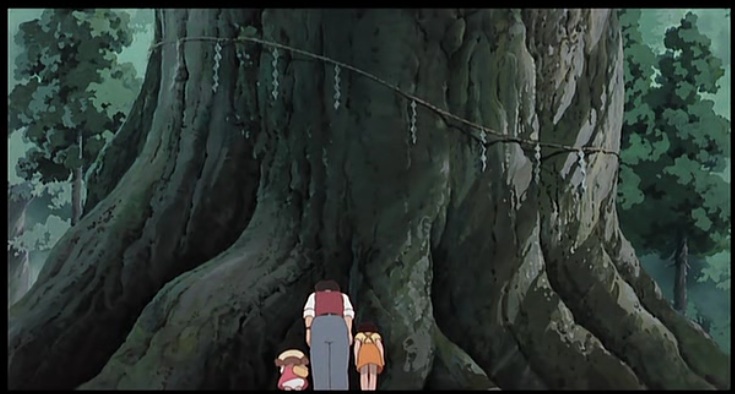A staple in Japanese manga and anime are the trappings of shinto practices. Shrines are frequent settings and, although they're rarely discussed directly, you see the architecture, objects, and designs as part of the background. I probably saw a shimenawa first in My Neighbor Totoro, which was perhaps the first anime I really watched. The giant camphor tree is almost a character in the movie and although I saw the shimenawa around it, I didn't know what it was or what it meant.

(image via ecostories)
I also saw a shimenawa in the anime Natsume Yujincho and the Book of Friends. Natsume breaks a shimenawa that releases a dangerous yōkai that ultimately becomes his guardian and tutor. Most recently, I've been reading Nekomusume Michikusa Nikki which includes shrines in the various settings and in which shimenawa feature prominently (if anonymously). There are also end-of-chapter information pages and one of them may have shown shimenawa.
For whatever reason, I realized that I didn't know anything about them, so I googled them. I didn't even know the word when I started, just searching for "japanese shrine tree rope" which helped me find a series of pages about them, including a wikipedia page. And that led me to the wikipedia page for shide. And a number of pages that described how to make them. I resolved to make one for my sakura tree.
In the pictures I had seen, a shimenawa seems to traditionally have a rope, tassels, and shide. So I went out to find the components to make one.
Shimenawa are traditionally made with rice straw, but hemp is also used. I was dubious about finding rice straw in this area. I thought about trying to find raw hemp, as it is increasingly grown in this area. But making rope looked like a lot of complicated work. So, cheating just a bit, I went to the store and found a heavy sisal rope for $1.35/foot and got a dozen feet.
When I got back with the rope, Alisa asked, "Did you measure it first?"
"Guess," I replied. She just smirked. But it turned out that 12 feet was exactly right: just long enough to tie a knot with no extra. OK. Maybe 14 feet would have been better.
For the tassels, I looked online and saw that people often make them with embroidery thread. The bundles of thread are already looped which makes it easy to tie up one end and cut the other to make a pretty tassel. And I considered getting brightly colored thread. But that seemed gaudy and out-of-place given what I had seen online. So I just bought a big ball of thick, jute twine, wrapped it around a large shim (I used an old 18 egg carton) and then tied up one end and cut the other. I also bought a length of thinner hemp string that I used to tie up the tassels -- and the ends of the rope -- and to hang everything.
I also bought a pad of thick drawing paper to make the shide. I had found a page on how to make shide, which explained how to make a series of cuts and then fold the paper up while rotating. It's easy, once you get the hang of it.

I ended up making 8 tassels and 4 shide. Once I had everything in hand, it was simple to tie the rope around the tree and then distribute the tassels and shide at likely spots along the length.

I'm pleased with the results. The total cost in materials was about $30. It took me several hours to purchase everything and then a couple of hours to make the tassels and shide and to hang everything on the tree. But it was a warm winter day with sun and I enjoyed the chance to do something outside and dream of the sakura blossoms to come.
And of course, I had to post a thread on twitter.
made a shimenawa for his beloved sakura tree / faris ŝimenavon por sia amata sakuro https://t.co/GjaW8PSoKr
— Steven D. BREWER (@limako) February 17, 2020
This first time was an experiment. Maybe by next time, I'll be ready to try actually making the rope. Or maybe not. It's fun either way.





